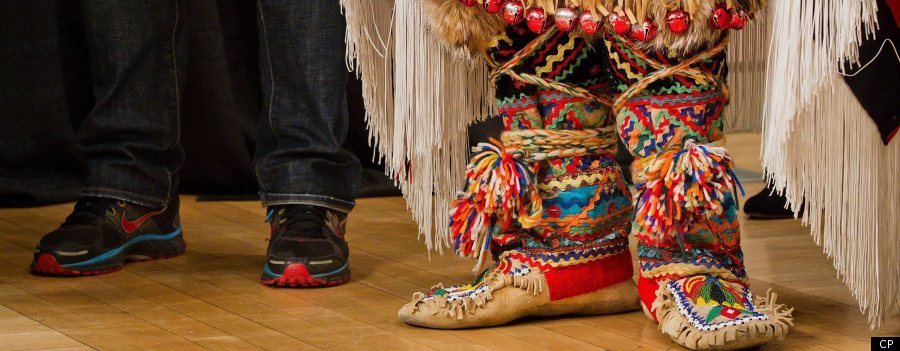VANCOUVER - First Nations' leaders in British Columbia say they've built "an unbroken wall of opposition" from the U.S border to the Arctic Ocean against a proposed $5.5 billion petroleum pipeline.
The leaders announced Thursday that several First Nations have added their names to the Save the Fraser River Declaration, bringing the total number of signatory nations in B.C. to 61 and effectively closing the province's borders to the Northern Gateway project proposed by Enbridge (TSX:ENB).
The leaders announced they are also opposed to any efforts by Kinder Morgan to export Alberta tar-sands crude oil from B.C.'s south.
"North or south, it makes no difference. First Nations from every corner of B.C. are saying absolutely no tar sands pipelines or tankers in our territories," said Jackie Thomas, chief of the Saik'uz First Nation, in a media release.
The Saik'uz First Nation is located west of Prince George, B.C.
"We have banned oil pipelines and tankers using our laws, and we will defend our decision using all the means at our disposal," added Thomas.
But Enbridge (TSX:ENB), the company behind the project, quickly fired back, stating many First Nations are still interested in partnering on the project.
According to Enbridge's website, the project would connect Kitimat, B.C. and Edmonton, Alta. by 1,200-kilometre-long pipeline.
That pipeline would carry more than a half-million barrels of a heavy crude oil, known as bitumen, to B.C.'s coast from Edmonton for export daily and import a petroleum product known as condensate,
Written in opposition to the pipeline, the Save the Fraser River Declaration bans tar-sands oil pipelines in Fraser River watersheds and also prohibits tankers from the migratory routes salmon use returning to the B.C. river that stretches 1,370 kilometres.
Chief Art Adolph, of the St'at'imc Nation, said he's opposed to any plans by the federal Conservative government to push the pipeline through.
"If they are serious about respecting our rights, the government of Canada must stop pushing the oil companies' line that this is in the public interest, and the government of B.C. should step up to the plate too and begin protecting our rivers and coastlines from further environmental damages that violate our basic human rights," he said.
The St'at'imc Nation call home to lands surrounding such communities as Whistler, B.C., Pemberton and Lillooet.
According to a statement from the office of Federal Natural Resources Minister Joe Oliver, the minister has stressed the importance of the pipeline.
"Minister Oliver has spoken on many occasions about our government's interest in expanding our energy export markets,'' said the statement.
Meantime, Enbridge said in a statement that First Nations are not unanimous in their opposition to the pipeline.
"We would point out that Enbridge continues to consult with many First Nations who remain interested in partnering with Northern Gateway," said company spokesman Paul Stanway.
He said while the project crosses three tributaries of the Fraser River, it does not cross the river directly.
Origin
Source:
The leaders announced Thursday that several First Nations have added their names to the Save the Fraser River Declaration, bringing the total number of signatory nations in B.C. to 61 and effectively closing the province's borders to the Northern Gateway project proposed by Enbridge (TSX:ENB).
The leaders announced they are also opposed to any efforts by Kinder Morgan to export Alberta tar-sands crude oil from B.C.'s south.
"North or south, it makes no difference. First Nations from every corner of B.C. are saying absolutely no tar sands pipelines or tankers in our territories," said Jackie Thomas, chief of the Saik'uz First Nation, in a media release.
The Saik'uz First Nation is located west of Prince George, B.C.
"We have banned oil pipelines and tankers using our laws, and we will defend our decision using all the means at our disposal," added Thomas.
But Enbridge (TSX:ENB), the company behind the project, quickly fired back, stating many First Nations are still interested in partnering on the project.
According to Enbridge's website, the project would connect Kitimat, B.C. and Edmonton, Alta. by 1,200-kilometre-long pipeline.
That pipeline would carry more than a half-million barrels of a heavy crude oil, known as bitumen, to B.C.'s coast from Edmonton for export daily and import a petroleum product known as condensate,
Written in opposition to the pipeline, the Save the Fraser River Declaration bans tar-sands oil pipelines in Fraser River watersheds and also prohibits tankers from the migratory routes salmon use returning to the B.C. river that stretches 1,370 kilometres.
Chief Art Adolph, of the St'at'imc Nation, said he's opposed to any plans by the federal Conservative government to push the pipeline through.
"If they are serious about respecting our rights, the government of Canada must stop pushing the oil companies' line that this is in the public interest, and the government of B.C. should step up to the plate too and begin protecting our rivers and coastlines from further environmental damages that violate our basic human rights," he said.
The St'at'imc Nation call home to lands surrounding such communities as Whistler, B.C., Pemberton and Lillooet.
According to a statement from the office of Federal Natural Resources Minister Joe Oliver, the minister has stressed the importance of the pipeline.
"Minister Oliver has spoken on many occasions about our government's interest in expanding our energy export markets,'' said the statement.
Meantime, Enbridge said in a statement that First Nations are not unanimous in their opposition to the pipeline.
"We would point out that Enbridge continues to consult with many First Nations who remain interested in partnering with Northern Gateway," said company spokesman Paul Stanway.
He said while the project crosses three tributaries of the Fraser River, it does not cross the river directly.
Origin
Source:

No comments:
Post a Comment